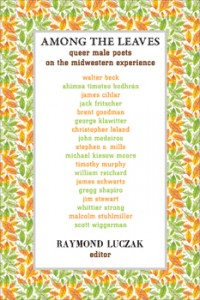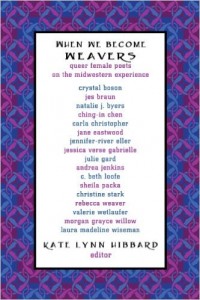 Among the Leaves: Queer Male Poets
Among the Leaves: Queer Male Poets
on the Midwestern Experience
Edited by Raymond Luczak
Squares & Rebels. 126 pages, $14.95 (paper)
 When We Become Weavers: Queer Female Poets on the Midwestern Experience
When We Become Weavers: Queer Female Poets on the Midwestern Experience
Edited by Kate Lynn Hibbard
Squares & Rebels. 100 pages, $14.95 (paper)
A MIDWESTERN pig farmer once told me that animals don’t like an animal that’s different from the group. If one is a different color or acts funny, the others will harass it or run it off or kill it. Such is life even today in many parts of the Midwest for queer people of all sorts. They’re often forced away from home. They go in search of others like themselves, usually in urban areas, where they have to fight to survive without roots or support, as all homeless people do.
Raymond Luczak is a Midwesterner who started Handtype Press in Minneapolis with an imprint called Squares & Rebels, which this year published two anthologies: one for “queer male poets” and one for “queer female poets,” both focusing on the “Midwestern experience.” These anthologies feel groundbreaking, because they provide a loving Midwestern home for queer people. Some of the poets write with nostalgia about the rural homes they left for the city. It’s never easy to turn your back completely on the place you grew up, even if you suffered there.
Family joys and woes, farm talk and county roads, trucks, Jesus, weather, hate “in the driftless zone of steep hills and valleys,” haylofts, horses, cows, and cornfields—these Midwestern poets conjure places and experiences not often mentioned in mainstream poetry. There is a vast emotional range; the poems rant, ponder, laugh, weep, and moan, and the message comes through that sometimes we can best understand who we are by writing about where we live.
In the poem “Moonstruck,” from the men’s anthology, Scott Wiggerman finds bitter consolation in the ever-looming Midwestern moon:
Suspended over the treeline
like a wayward prisoner,
the moon has never looked
so swollen or so lonely.
In “Repatriation,” Ahimsa Timoteo Bodhran’s arch words speak volumes: “You’re gonna say something to two queer Native boyz in a Native museum, really?” In “Epinikion Ode,” Timothy Murphy wrestles with his longing for land-love and man-love:
I cease to be a man of the Midwest.
It’s fourteen years since last I sank a plough
in Svea-Beardon loam. My heart turns now
west, to the rivers where the magpies nest.
The title of the women’s anthology, “When We Become Weavers,” is from an essay by Adrienne Rich, “Women and Honor: Some Notes on Lying.” In the poem “Iowa,” Valerie Wetlaufer tells the truth about a curving queer vision, which is suppressed by the Midwestern flatland:
Many will have you believe
this flatland has nothing to hide.
Her curves are one of many
elements she conceals.
Crystal Boson nails centuries of racism in the first four lines of “the metaphysics of nigger hating”:
back then we knew us better
they learned to fear
all in their neckbones
lest they congregate in trees
In “Prayer,” Laura Madeline Wiseman captures the strength of young lesbian love, which must walk against the powerful conformist “flow” in the Midwest:
It is the girl with a tear penned
in black ink, black hair lifting
as she walks against the hallway’s flow
who will love me, red flannel unbuttoned
The poems in these companion anthologies bring beauty and healing to the so-often ugly and harsh experiences of queer readers in the Midwest. It’s heartening at last to hear these voices from the Heartland.
Mary Meriam is a poet and founder of the e-zine Lavender Review.






